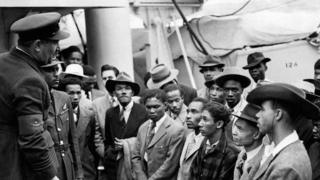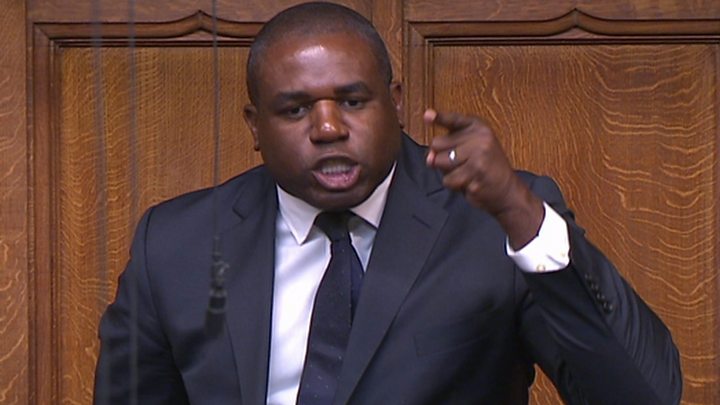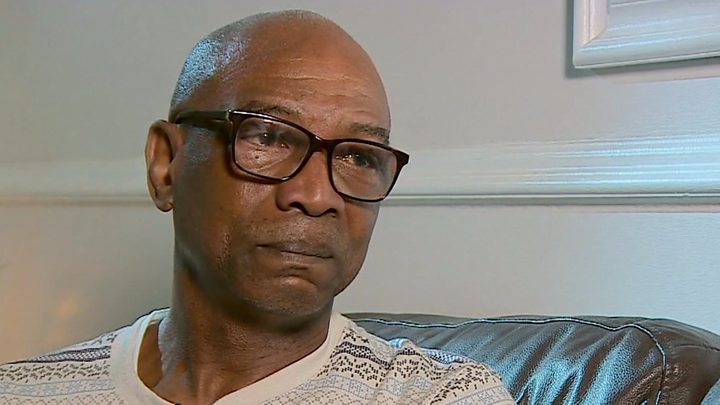 Image copyright
Image copyright
PA
The Windrush generation began arriving in the UK in 1948
The home secretary has apologised for the treatment of the Windrush generation, saying it was “wrong” and “appalling” that some face deportation.
Many immigrants who arrived from the Commonwealth decades ago as children have been told they are here illegally.
Amber Rudd said they would be helped to attain required documents for free and added she was concerned her department “sometimes loses sight” of individuals.
Labour’s David Lammy said it was a “day of national shame”.
The Tottenham MP said it was “inhumane and cruel” that it had taken for the government so long to act.

Addressing Ms Rudd in the House of Commons, he added: “It has come about because of a hostile environment policy that was begun under her prime minister.
“Let us call it as it is; if you lay down with dogs, you get fleas, and that is what has happened with this far-right rhetoric in this country.”
Thousands of people arrived in the UK as children in the first wave of Commonwealth immigration 70 years ago.
They are known as the Windrush generation – a reference to the ship, the Empire Windrush, that brought workers from the West Indies to Britain in 1948.
Under the 1971 Immigration Act, all Commonwealth citizens already living in the UK were given indefinite leave to remain – but the right to free movement between Commonwealth nations was ended from that date onwards.
However, the Home Office did not keep a record of those granted leave to remain or issue any paperwork confirming it, meaning it is difficult for the individuals to now prove they are in the UK legally.
Recent changes to immigration law in the UK, which requires people to have documentation to work, rent a property or access benefits, including healthcare, has highlighted the issue and left people fearful about their status.

Home Secretary Ms Rudd confirmed new measures to the House of Commons to help the Windrush generation.
These include:
- A new taskforce dedicated to helping those affected
- Plans for the team with departments across government to gather evidence on behalf of immigrants
- A pledge that all cases will be resolved in two weeks
- All fees for new documentation waived so people are not “out of pocket”
- A new website will be set up with information and a direct contact point
Ms Rudd said: “I do not want any of the Commonwealth citizens who are here legally to be impacted in the way they have and frankly, some of the ways they have been treated is wrong, has been appalling, and I am sorry.”
Ms Rudd also said she was “concerned that the Home Office has become too concerned with policy and strategy, and sometimes lose sight of the individual”, but it was why she decided to act.
‘Warm words are not enough’
However, when asked how many of the Windrush generation have been deported as a result of this issue, Ms Rudd said she would have to speak to High Commissioners of different Commonwealth countries to find out if any cases existed.
She told the Commons she was “not aware of any person being removed in these circumstances” and asked anyone who did know of cases to report them to the Home Office.
Shadow home secretary Diane Abbott said the government should consider compensation for anyone who had been wrongly deported.
She said: “We now hear warm words about Commonwealth migrants who have given their lives to this country, but warm words are not enough.”
‘No question of right to remain’
Earlier, immigration minister Caroline Nokes said some “terrible mistakes” were made in cases involving the Windrush generation, but she did not answer questions over deportation.
Asked by ITV News if any people had been deported as a result of these “mistakes”, Ms Nokes said: “There have been some horrendous situations, which as a minister have appalled me.”
Told by the reporter “that’s a yes”, and asked how many, she said: “No, I don’t know the numbers, but what I’m determined to do going forward is we’ll have no more of this.”

A cross-party letter to the prime minister, co-ordinated by Mr Lammy, had called for a “swift resolution of this growing crisis”.
It was signed by 140 MPs, including Labour leader Jeremy Corbyn and Conservative MP Sarah Wollaston.
Soon after, the prime minister reversed her decision not to meet Commonwealth leaders to discuss the issue. A meeting is now set for Tuesday.
London mayor Sadiq Khan said he welcomed Mrs May’s decision to meet other leaders, but added: “She must now go further and make an immediate commitment to recognise and secure the rights of Commonwealth citizens.”
Analysis: What has changed?
By BBC Reality Check
Changes to the immigration system from 2012 onwards clamped down on people living in the UK illegally, introducing new checks by employers, landlords and the NHS.
And some people who arrived legally decades ago are being caught out by these checks, when they try to rent a house or get medical treatment, because they aren’t able to prove their status.
That’s because the Home Office didn’t keep records of those it granted indefinite leave to remain in the 1970s, and not everyone went on to apply to become British citizens.
To prove they are living in the country legally, people in this situation must currently apply for No Time Limit (NTL) status at a cost of £229.
They must provide documentation for every year they have been in the country, which can include payslips, bank statements and educational or medical records.
The Home Office says more informal testimonies will do. But a legal charity, the Joint Council for Welfare of Immigrants, says that in practice many are having their applications rejected if they are not able to provide up to four pieces of formal documentation for each year.
The Migration Observatory at Oxford University estimates there are 500,000 people resident in the UK who were born in a Commonwealth country and arrived before 1971.
People born in Jamaica and other Caribbean countries are thought to be more affected than those from other Commonwealth nations, as they were more likely to arrive on their parent’s passports without their own ID documents.
Image copyright
Getty Images
The Empire Windrush arriving at Tilbury Docks with 482 Jamaicans on board
Many have never applied for a passport in their own name or had their immigration status formalised, as they regarded themselves as British.
The Guardian newspaper has highlighted a number of cases of such people being threatened with deportation.
Are you a member or descendant of the Windrush Generation – or did you arrive in the UK from another Commonwealth country as a minor between 1948-1971? We’d like to hear from you via email haveyoursay@bbc.co.uk.
Please include a contact number if you are willing to speak to a BBC journalist. You can also contact us in the following ways:
- WhatsApp: +44 7555 173285
- Send pictures/video to yourpics@bbc.co.uk
- Upload your pictures / video here
- Tweet: @BBC_HaveYourSay
- Text an SMS or MMS to 61124 (UK) or +44 7624 800 100 (international)
Amber Rudd: Windrush generation treatment ‘appalling’}

